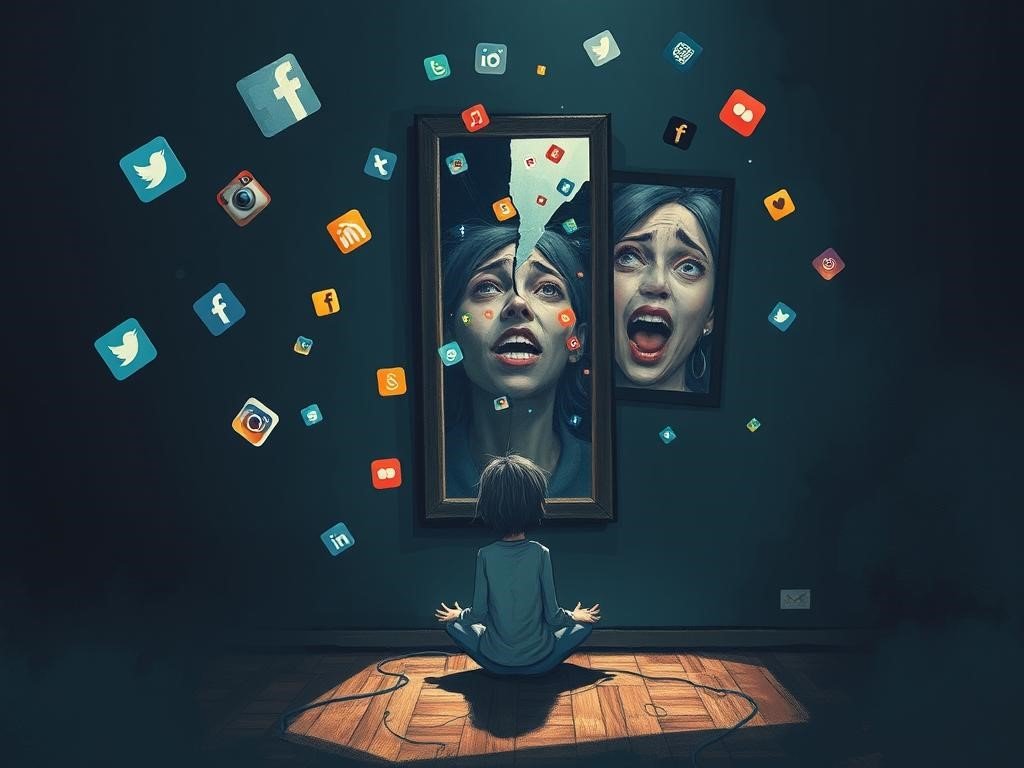Social Media’s Impact on Mental Health, Social media has become a big part of our lives today. It connects us but also affects our mental health deeply. It’s important to see how our online actions affect our well-being.
Social media addiction and cyberbullying are common issues. Trying to look perfect online can hurt our self-esteem and make us feel left out. This leads to more depression, loneliness, and anxiety.
This article will look at how social media affects our mental health. We’ll see why people get addicted and how online interactions affect us. We’ll also talk about keeping a good balance between our online and real lives.
Key Takeaways
- Social media usage has been linked to mental health issues, including depression, anxiety, and low self-esteem.
- Cyberbullying and online harassment can have a significant impact on an individual’s emotional well-being.
- The pressure to maintain a perfect online persona can lead to body image issues and FOMO (fear of missing out).
- Social media addiction can negatively impact an individual’s ability to focus, sleep, and engage with the real world.
- Developing healthy social media habits and maintaining a balanced lifestyle can help mitigate the negative effects of social media on mental health.
The Rise of Social Media and Its Influence
In recent years, social media has grown fast, changing how we connect and get information. These platforms are now a big part of our lives, affecting our actions, thoughts, and mental health.
Exploring the Pervasive Nature of Social Platforms
Social media has become more than just a way to talk to each other. It has become a big part of our lives, influencing what we do and expect. Platforms like Facebook, Instagram, TikTok, and Twitter are now a big part of our personal and work lives.
Being always connected through social media has made us feel closer to each other. But, it has also brought new problems. The need to always share our lives online has led to social media addiction. This is caused by the fear of missing out (FOMO) and wanting constant approval from others.
Examining the Reasons Behind Social Media Addiction
Social media is attractive because it gives us quick rewards like likes and comments. This makes our brains release dopamine, which is linked to feeling good and wanting more. This can make it hard to stop using social media.
Also, online harassment and cyberbullying on social media are big problems. They can hurt our mental health. The fact that people can hide behind screens and not be held accountable can lead to mean behavior. This can make us feel alone, anxious, and sad.
As social media keeps growing, we need to understand why it’s so popular and its effects on our mental health. By knowing these issues, we can try to have a healthier relationship with social media.
Mental Health and the Effects of Social Media
Social media’s growing influence is making us worry about our mental health. Being constantly exposed to perfect images online can deeply affect how we see ourselves and our happiness.
Using social media too much can lead to body image issues. Seeing perfect images all the time makes us feel not good enough. This can lower our self-esteem and increase the chance of depression.
Trying to be like others and worrying about missing out (FOMO) can make us anxious and lonely online. Wanting more likes and validation can make us feel cut off from real friends and our true feelings.
| Mental Health Concern | Potential Impact of Social Media |
|---|---|
| Body Image Issues | Increased feelings of inadequacy and distorted self-perception |
| Self-Esteem | Decline in self-worth and confidence due to social comparison |
| Depression | Increased risk of developing depressive symptoms |
| Internet Anxiety | Constant need for validation and fear of missing out (FOMO) |
| Loneliness | Disconnection from real-world relationships and emotional needs |
We need to be careful and thoughtful about how we use social media. Knowing the risks and managing our online time can help us stay healthy. This way, we can have a good relationship with these platforms.
“The well-being of social media users is intrinsically linked to the way they engage with these platforms. Striking a healthy balance is essential for maintaining mental health and overall well-being.”
Conclusion
Social media has a big impact on our mental health. It’s important to find a balance in this digital world. Social platforms have changed our lives, making it easier to connect with others. But, they can also harm our mental health.
We’ve looked into why social media is so addictive and its effects on our mental health. The need to look perfect online, the fear of missing out, and wanting validation can make us feel anxious, depressed, and bad about ourselves.
We need to keep mental health in mind as we use social media. Talking openly, learning about media, and supporting research and education are important steps. Understanding how social media affects our mental health helps us make better choices. This way, we can live healthier digital lives.
FAQ
What are the potential negative effects of social media on mental health?
Social media can harm mental health in many ways. It can lead to addiction, cyberbullying, and body image problems. It can also cause internet anxiety, lower self-esteem, depression, and make people feel lonely.
How does social media contribute to addiction and the fear of missing out (FOMO)?
Social media makes us crave social validation and the need to stay connected. This can lead to addiction. Seeing perfect lives online can make us feel left out, causing FOMO. This can make us more likely to keep scrolling.
What is the impact of online harassment and cyberbullying on mental health?
Being bullied online can really hurt our mental health. It can make us anxious, depressed, and feel bad about ourselves. It can even make us think about ending our lives. Social media’s lack of accountability lets bullies hide, making things worse for victims.
How does social media use affect body image and self-esteem?
Seeing perfect, edited images online can hurt our body image and self-esteem. These images make us think we need to look a certain way. This can make young people feel bad about themselves.
What is the connection between social media use and mental health issues like depression and loneliness?
Using social media too much can make us feel depressed and lonely. It can make us feel like our online life is not real. Comparing ourselves to others’ perfect lives can make these feelings worse.


